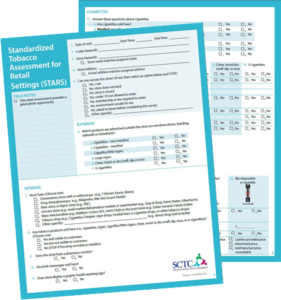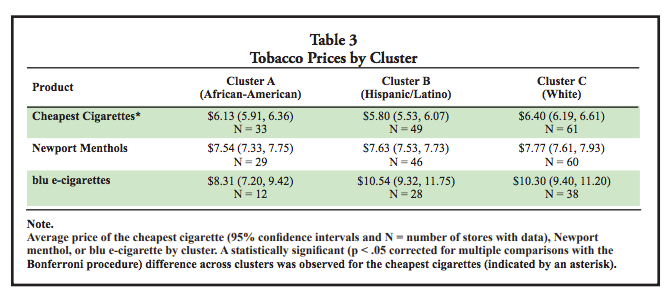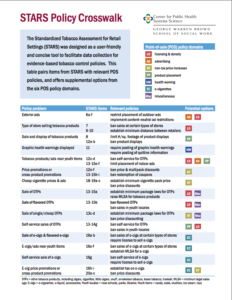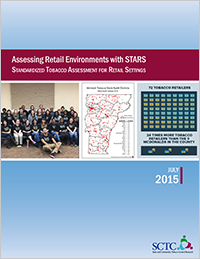STARS
 Background:
Background:
The Standardized Tobacco Assessment for Retail Settings (STARS) surveillance tool was designed for practitioners to inform state and local tobacco control policies for the point of sale. The STARS form and training materials resulted from a collaboration of SCTC researchers with stakeholders from five state health departments, the CDC, and the Public Health Law Center (formerly the Tobacco Control Legal Consortium). The assessment items (e.g., price, product promotions) were selected exclusively for their policy relevance; no items function as compliance checks for federal regulations. This user-friendly tool can be filled out by professionally trained data collectors, as well as self-trained youth and adults.
 Download Materials:
Download Materials:
- STARS surveillance tool (1 page, double-sided, 20 questions)
- Training PowerPoint (93 slides for self- or group-administered instruction)
- Pocket Guide (10-page instructional review for use in the field – assembly required)
- Pocket Guide Assembly Instructions (brief instructions on how to assemble pocket guide)
- Excel Data Entry Template (used to enter survey data and compute outcomes)
Getting Started:
- Download STARS surveillance tool and the supporting materials above. Print the STARS survey and Pocket Guide (assembly required).
- Identify a sample of stores. This may be a group of stores that is convenient for you and your data collectors to reach (e.g., all stores within 1 mile of school). It may also be a random sample of licensed tobacco retailers or you might have access to a statistician who can draw a sample of stores for you. There is no right or wrong way to select your sample.
- Identify your data collectors. You may be the only data collector or you may have professionally-trained or volunteer data collectors, either adults or youth.
- Train yourself and your data collectors. Review the Training PowerPoint as a group (e.g. live presentation/webinar) or individually. Become familiar with the questions and products reviewed in the training materials. If youth data collectors are used, it may be helpful to role play the clerk/data collector interaction.
- Collect data using STARS. Send your data collectors into stores with the Pocket Guide and STARS survey. Note: We recommend adult supervision in stores when using youth data collectors.
- Enter and analyze data. Once data collection is complete, use the Excel Data Entry Template to enter survey data, view outputs, and analyze findings.
- Disseminate your findings to stakeholders and data collectors.
- Follow-up with STARS developers. We would love to hear about your experience using STARS and your findings!
STARS Success Stories:
Assessing Retail Environments with STARS: Standardized Tobacco Assessment for Retail Settings details experiences from the 2014 pilot of STARS in four states: Indiana, Oregon, Texas, and Vermont. This report from the Center for Public Health Systems Science (CPHSS), as part of the Advancing Science and Policy in the Retail Environment (ASPiRE) project funded by the National Cancer Institute (NCI) SCTC Research Initiative, provides examples for other state and local tobacco control coalitions considering integrating STARS into their efforts.
Identifying Disparities and Policy Needs with the STARS Surveillance Tool
In Milwaukee, WI, the STARS tool was used to identify and document disparities in the tobacco retail environment. Three demographically distinct zip code clusters (3 predominantly African-American zipcodes, 2 predominantly Latino/Hispanic zipcodes, and 4 predominantly white zip codes) were selected, and community tobacco control workers and volunteers conducted store assessments at a random sample of retailers from each. Menthol cigarettes were more often advertised outside retailers and available at a discount in the African-American cluster. The average cheapest pack of cigarettes was $5.80 in the Hispanic cluster, $6.13 in the African-American cluster, and $6.40 in the white cluster. While e-cigarettes were more often available at stores in the white cluster, they were more often placed near candy or sold at a discount in the African-American cluster. Similarly, cigarettes were more likely to be displayed near candy, advertised within 3 ft of the floor, and sold at a discount in the African-American cluster. Little cigars/cigarillos were also more likely to be displayed near candy in the African-American cluster, and were least often sold as singles or for less than $1 in the white cluster. The stakeholders involved in the project used these findings to discuss appropriate policy interventions, such as a state-level minimum floor price for cigarettes, prohibiting price discounts, and zoning restrictions to reduce point-of-sale disparities seen across the city. Following the success of this project, the Wisconsin Tobacco Prevention and Control Program adopted STARS to conduct store assessments across the state. Counter Tools provided technical assistance on the STARS tool for this project. 
This project involved multiple stakeholders including: The Wisconsin Tobacco Prevention Control Program, the University of Wisconsin-Milwaukee, City of Milwaukee Tobacco Free Alliance; Tobacco-Free Suburban Milwaukee & Ozaukee Counties; The Wisconsin Tobacco Prevention and Poverty Network; The Wisconsin African American Tobacco Prevention Network; and the The Wisconsin Hispanic/Latino Tobacco Prevention Network. Read the full paper, published in Tobacco Regulatory Science.
 STARS Policy Crosswalk:
STARS Policy Crosswalk:
The STARS Policy Crosswalk is a table that pairs items from STARS with relevant POS policies and offers supplemental options from the six POS policy domains.



